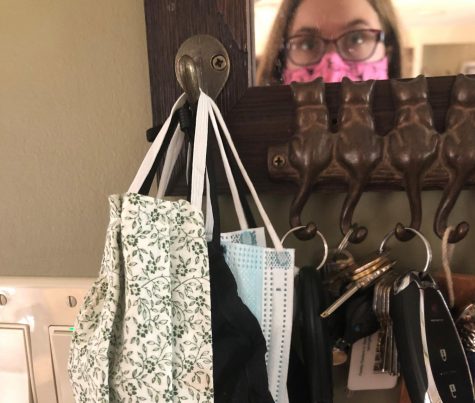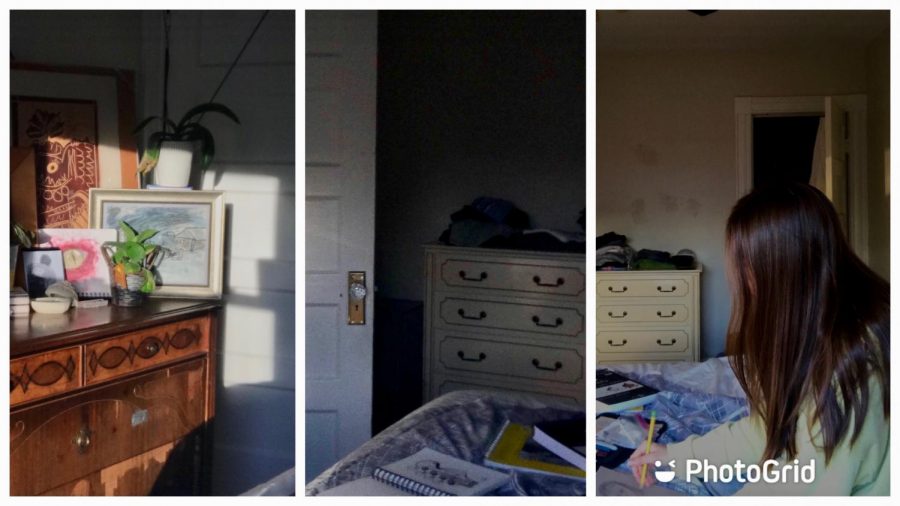Chaug Teens Struggle with Mental Health
Dakotah Pavoni, a sophomore at Minnechaug, draws in her room
December 16, 2020
Teens at Minnechaug are struggling after being cut off from their friends and family with no knowledge on when things would return to normal. According to national statistics, after the quarantine, 55% of teens said they had experienced anxiety and 43% said they had experienced depression.
According to The Council, a research group for mental health, “80% of adolescent girls ‘feel more lonely and isolated than before,’” due to the extended quarantine that occurred last spring.
More than half of teens are feeling a severe impact on their mental health and very few know how to cope. How can they continue to move forward while their mental health is worsening? How can adults at Chaug help to support them?
Many adults noticed that teen mental health has worsened over the past few months. Guidance Counselor Chenda Raffaele and Adjustment Counselor Darcy Andre both agreed that teens were showing increased signs of depression and anxiety and that students struggled to find the motivation to do school work.
After interviewing Junior (then sophomore) Claire Robinson and Sophomore (then freshman) Dakotah Pavoni, it became clear that adults weren’t the only ones noticing decreased mental health for teens. Pavoni reported feeling “alone in the same house”, that even with her family with her she was still feeling increasingly isolated, lonely, and anxious.

As quarantine began, it became increasingly hard for teens to maintain social connections. While being stuck in their house, the only way to contact friends was over social media. This played a huge role in the decrease of their mental health.
Robinson explained that this was one of the hardest parts for her. “I was out of shape for social interaction. I was out of practice,” she said.
“The worst part about it is not giving or receiving hugs” described Pavoni. She was only able to call her friends, but this wasn’t the same.
Another issue many teens faced was the inability to maintain a structure. Robinson and Pavoni both reported that they struggled to maintain a schedule, which led to them feeling like they could get nothing done.
However, there weren’t only negatives to the extended quarantine. Many teens did feel less stressed about school and were able to get more sleep due to the more relaxed schedule. Robinson felt that many of her classes were more relaxed and that because of this she felt less stressed about school.
Mrs. Andre said that many students were able to get more sleep as they were less busy and able to slow down more. They were also able to reconnect with their families as they had to find creative ways to keep busy.
“Students who have had strained relationships with families, the extra time with family members has helped. Families have been able to spend more time together doing more enjoyable things rather than more routine things.” said Mrs. Andre
The overwhelming agreement for an improvement on teen mental health was the ability to take a step back and to do something they enjoy. Whether it be drawing, baking, listening to music, or exercising, taking time for themselves allowed many teens to recenter and take a break.
Parents and guardians can help their teens by assisting them in creating structure in their daily schedule. They can show their teens that it is okay to ask for help, and that everyone is struggling right now. Most importantly, parents can show their teens that they can always find a safe place with them.
After all, as Mrs. Raffaele said, “Those who are doing the best are the ones with the most support.”
If you are struggling, there is help in Minnechaug. You can speak with a guidance counselor or adjustment counselor by going to the Guidance Department.




Makayla A • Feb 10, 2021 at 9:10 am
This is a great topic to cover and bring more awareness on especially through this pandemic right now. I like how it mainly talks about teens but it also talks about how it is affecting everyone.
Ellaree.D • Feb 10, 2021 at 9:01 am
This is relatable I feel we can also still feel isolated without being isolated.
NaTasha Cox • Feb 10, 2021 at 8:39 am
Excellent job on this Quinn, this is a great topic to focus on because it is slightly hidden in today’s world!!
Margaret Szpakowski • Feb 10, 2021 at 7:37 am
Great use of pictures in this article to show what the “new normal” looks like. I appreciate how you also gave resources for people who need help because I think this article can help people.
Ethan Ray • Jan 6, 2021 at 9:56 am
This article was very informative and well written. It is very sad that so many people are experiencing bad things, but this is good for other people because it gives people the opportunity to help them. People could even gain a few friends. I hope these students find their person to help them. Good job on the article.
Cameron Kolisko • Jan 6, 2021 at 9:55 am
This article is great! It provides insights on a huge problem affecting everyone in the community.
CJ Cronin • Jan 6, 2021 at 9:48 am
Great article. It is very smart and informative.
Ryan Dufresne • Jan 6, 2021 at 9:47 am
Very well written Quinn and shows issues I know many students are facing
Lindsay L • Dec 23, 2020 at 9:52 am
Thank you for writing about this. Mental health in school is often overlooked. Thank you for addressing this to make people more aware of how people are feeling now especially during our teenage years.
madison laliberte • Dec 23, 2020 at 9:51 am
You did an amazing job Quinn! this was very relatable and speaks about a serious topic for today’s society
Kaileigh Letourneau • Dec 23, 2020 at 9:50 am
The article was well written and had good points to offer on the past year. During this time I had become isolated and reverted back into a dark place, but I did have people with me to help. The article provides an insight into feelings we sometimes don’t see from others on a daily basis. Great job Quinn!!!
rachel letendre • Dec 23, 2020 at 9:50 am
I think this is an important issue to address, as many parents, teachers, and students alike don’t seem to understand the struggles some are facing during remote learning. thank you for giving the ones struggling a voice 🙂
justine • Dec 23, 2020 at 9:49 am
i think this was a great topic to talk about and inform people on what teens are going through! Great job!
Allison Clifford • Dec 23, 2020 at 9:49 am
This is such a great topic to bring awareness too! Great job Quinn!!
paige • Dec 23, 2020 at 9:48 am
This is a great topic to write on!
Jacob Keller • Dec 23, 2020 at 9:47 am
Very well done Quinn. It’s nice to see that someone is talking about a more relevant issue that some people may not understand a whole lot about.
gage vedovelli • Dec 23, 2020 at 9:46 am
nice article
Ella Perry • Dec 21, 2020 at 6:53 am
Great job on this Quinn! 🙂
ashleigh dugay • Dec 21, 2020 at 6:50 am
I feel like this story is how everyone is feeling with not being able to do much because i know since all this started i’ve been feeling really depressed and down with myself because i can’t see my friends when ever i would like to without the worry of catching covid so i related to this article.
meghan • Dec 21, 2020 at 6:49 am
i think this is a very important topic! good job
Mike • Dec 21, 2020 at 6:48 am
Very important in today’s world people start talking about the mental struggles High Schoolers go through.
Brandon Gormley • Dec 18, 2020 at 8:29 am
I think that what this article talks about is true, this whole situation came out of nowhere leaving lots of people with a lot of anxiety about whats going on and whats going to happen next. As well as it has been harder to maintain a good productive schedule during these times.
Emma Arendt • Dec 18, 2020 at 8:18 am
Great work Quinn! Amazing article
ben • Dec 18, 2020 at 8:16 am
This story was very relatable and good to hear someone speak on such a trending issue, good work!
Jared Thans • Dec 18, 2020 at 8:15 am
I feel this is a very well written article that covers an important topic in today’s world.